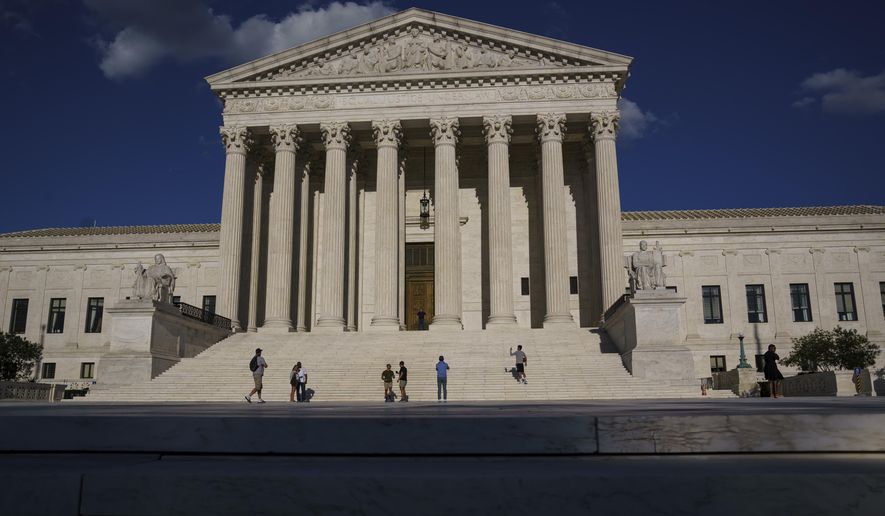The Supreme Court’s decision to let stand a Texas ban on most abortions has sent Democrats scrambling to safeguard abortion rights and to prevent the law from becoming a blueprint for other states.
Sen. Amy Klobuchar said Sunday the Senate should abolish the 60-vote filibuster threshold to help clear the way for Roe v. Wade to be codified into law. The Minnesota Democrat voiced her support for “packing” the Supreme Court and for Justice Stephen G. Breyer to retire “sooner rather than later.”
“I believe we should abolish the filibuster,” Ms. Klobuchar said. “I do not believe an archaic rule should be used to allow us to put our heads in the sand, to use Justice [Sonia] Sotomayor’s words, to put our heads in the sand, and not take action on the important issues, the challenges that are facing our country right now, now and over the next years.”
She added: “We just will get nowhere if we keep this filibuster in place.”
The push to eliminate the filibuster, however, has faced opposition from Democratic Sens. Joseph Manchin III of West Virginia and Kyrsten Sinema of Arizona.
In a 5-4 ruling last week, the Supreme Court denied an emergency request to block Texas’ abortion law from going into effect.
Justices Clarence Thomas, Samuel A. Alito Jr., Neil M. Gorsuch, Brett M. Kavanaugh and Amy Coney Barrett voted not to block the law. Chief Justice John G. Roberts Jr. joined the liberal Justices Breyer, Sotomayor and Elena Kagan in dissent.
The law bans abortions if fetal cardiac activity is detected, which can be as early as six weeks into pregnancy. The law allows private citizens — not government officials — to sue abortion providers for violating the ban.
It is reigniting the emotional debate over abortion rights, energizing pro-choice and pro-life activists.
It also has given Democrats a way to shift the conversation away from the nation’s chaotic exit from Afghanistan and a disappointing jobs report.
“People are shocked, horrified, outraged,” Rep. Veronica Escobar of Texas said on CBS’ “Face the Nation.”
President Biden denounced the law last week, saying it is creating “a vigilante system” and calling it “almost un-American.”
On Sunday, White House Chief of Staff Ron Klain said the administration is looking to come up with answers.
“We have the best lawyers at the Justice Department looking for legal remedies to protect women who are seeking to exercise their constitutional rights,” Mr. Klain said on CNN’s “State of the Union.”
House Speaker Nancy Pelosi is vowing to bring legislation to the floor of the House to codify Roe v. Wade into law.
Democrats, however, would struggle to pass the legislation in the 50-50 Senate, where Vice President Kamala Harris holds the tie-breaking vote.
Ms. Escobar said the filibuster remains a major obstacle.
“My fear is that some members of the Senate will use the filibuster as an excuse to not take action,” she said. “And in the face of inaction, we will see more deaths in Texas. Texas is now a very dangerous place for women and children.”
Republicans say the pushback from Democrats has been overblown.
Sen. Bill Cassidy, Louisiana Republican, noted that the Supreme Court focused on “standing” and did not rule on the merits of the law.
“I think the Supreme Court will swat it away once it comes to them in an appropriate manner,” Mr. Cassidy said on ABC’s “This Week.” “If it is as terrible as people say it is, it will be destroyed by the supreme court. But to act like this is an assault on Roe v. Wade is again something the president is doing, I think, to distract from his other issues.”
Turning to Justice Breyer, Ms. Klobuchar said the court’s decision should up the ante on the oldest of the liberal justices on the court.
“If he is seriously considering retirement — and he has said he would do it based on not only his own health, but also the future of the court — if this decision doesn’t cry out for that, I don’t know what does,” she said on “State of the Union.”
“That’s not going to change the results [of rulings] necessarily, but at least it doesn’t put it at 7-2,” she said.
The focus on the 83-year-old justice’s future on the court intensified following Justice Ruth Bader Ginsburg’s death. Justice Ginsburg opted against retiring when former President Barack Obama and the Democrats held the White House and Congress.
The decision ultimately set the stage for former President Donald Trump to nominate Amy Coney Barrett for the court following Justice Ginsburg’s death last year.
• Seth McLaughlin can be reached at smclaughlin@washingtontimes.com.




Please read our comment policy before commenting.